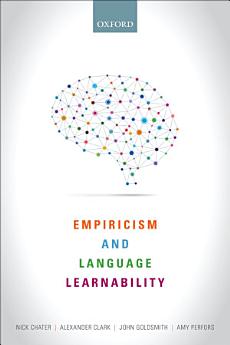Empiricism and Language Learnability
Jul. 2015 · OUP Oxford
E-boek
272
Bladsye
family_home
Geskik
info
reportGraderings en resensies word nie geverifieer nie. Kom meer te wete
Meer oor hierdie e-boek
This interdisciplinary new work explores one of the central theoretical problems in linguistics: learnability. The authors, from different backgrounds---linguistics, philosophy, computer science, psychology and cognitive science-explore the idea that language acquisition proceeds through general purpose learning mechanisms, an approach that is broadly empiricist both methodologically and psychologically. For many years, the empiricist approach has been taken to be unfeasible on practical and theoretical grounds. In the book, the authors present a variety of precisely specified mathematical and computational results that show that empiricist approaches can form a viable solution to the problem of language acquisition. It assumes limited technical background and explains the fundamental principles of probability, grammatical description and learning theory in an accessible and non-technical way. Different chapters address the problem of language acquisition using different assumptions: looking at the methodology of linguistic analysis using simplicity based criteria, using computational experiments on real corpora, using theoretical analysis using probabilistic learning theory, and looking at the computational problems involved in learning richly structured grammars. Written by four researchers in the full range of relevant fields: linguistics (John Goldsmith), psychology (Nick Chater), computer science (Alex Clark), and cognitive science (Amy Perfors), the book sheds light on the central problems of learnability and language, and traces their implications for key questions of theoretical linguistics and the study of language acquisition.
Meer oor die skrywer
Nick Chater is Professor of Behavioural Science at Warwick Business School, after previously holding chairs in psychology at Warwick and UCL. He has over 200 publications, has won four national awards for psychological research, and has served as Associate Editor for the journals Cognitive Science, Psychological Review, and Psychological Science. He was elected a Fellow of the Cognitive Science Society in 2010 and a Fellow of the British Academy in 2012. He works on the cognitive and social foundations of language and rationality. Alexander Clark is a Lecturer in Logic and Linguistics in the Department of Philosophy at King's College London; before that he taught for several years in the Computer Science department of Royal Holloway, University of London. His first degree was in Mathematics from the University of Cambridge, and his Ph.D. is from the University of Sussex in Artificial Intelligence. He then postdoctoral research at the University of Geneva, in the Institute for the Study of Semantics and Cognition. His research is on unsupervised learning in computational linguistics, grammatical inference, and theoretical and mathematical linguistics. Amy Perfors is a senior lecturer in computational cognitive science in the Department of Psychology at the University of Adelaide in Australia. She has a B.S. in Symbolic Systems and an M.A. in Linguistics from Stanford University, and a PhD in Brain & Cognitive Sciences from MIT. Her research focuses on a variety of topics in psychology and linguistics. It centres on what biases and assumptions people (both adults and children) bring to different learning problems, and how those assumptions shape the inferences they make and the things they learn. John Goldsmith is Edward Carson Waller Distinguished Service Professor of Linguistics and Computer Science at the University of Chicago, where he has been since 1984. He received his PhD in linguistics in 1976 from MIT for work developing the model of autosegmental phonology, which he has applied to problems of general phonological theory and to Bantu tone systems in particular. Since the late 1990s he has been working on the computational problem of unsupervised learning of natural language morphology. He is also co-author, with Bernard Laks, of the forthcoming Language and the Mind: Encounters in the Mind Fields, a historical study of the connections between linguistics, philosophy, and psychology.
Gradeer hierdie e-boek
Sê vir ons wat jy dink.
Lees inligting
Slimfone en tablette
Installeer die Google Play Boeke-app vir Android en iPad/iPhone. Dit sinkroniseer outomaties met jou rekening en maak dit vir jou moontlik om aanlyn of vanlyn te lees waar jy ook al is.
Skootrekenaars en rekenaars
Jy kan jou rekenaar se webblaaier gebruik om na oudioboeke wat jy op Google Play gekoop het, te luister.
E-lesers en ander toestelle
Om op e-inktoestelle soos Kobo-e-lesers te lees, moet jy ’n lêer aflaai en dit na jou toestel toe oordra. Volg die gedetailleerde hulpsentrumaanwysings om die lêers na ondersteunde e-lesers toe oor te dra.





